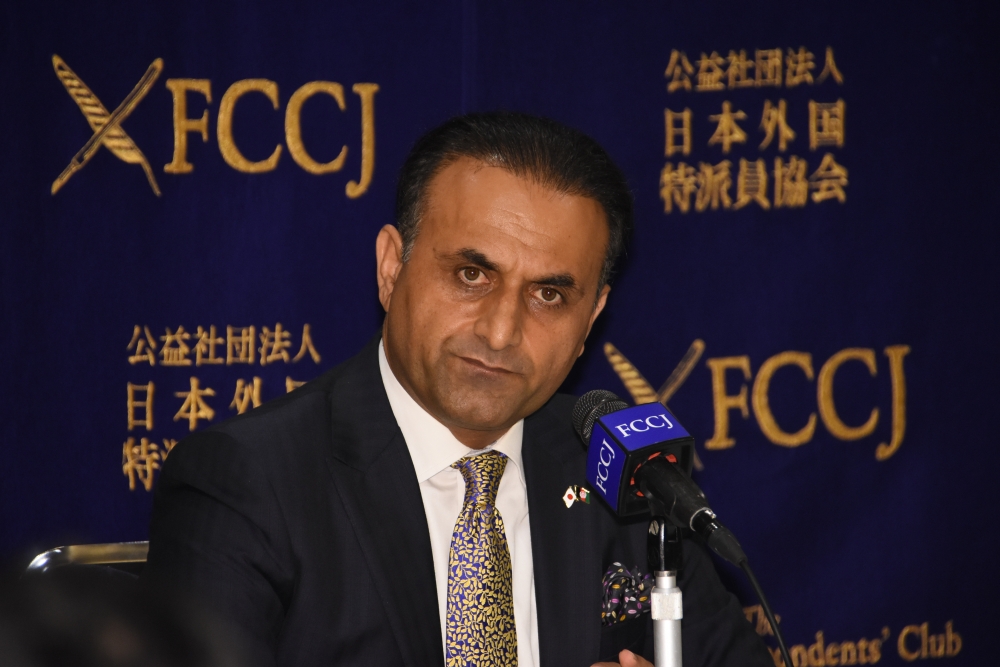Issue:
September 2023
The international community must not fail Afghanistan again, its ambassador to Japan tells FCCJ

Two years have passed since the world witnessed horrifying images of Afghan citizens desperately clinging to U.S. airplanes to escape the Taliban regime after it overthrew the government of President Ashraf Ghani.
“The country is mired in hardship,” Shaida Mohammad Abdali, Afghanistan’s ambassador to Tokyo, said at a recent press conference at the FCCJ
Abdali was appointed Afghan ambassador to Tokyo in May 2021. In August that year Kabul was captured by the Taliban. While there is no diplomatic recognition between the Japanese government and the Taliban, Japan continues to recognize Abdali as the representative of Afghanistan.
“Ninety percent of the population is grappling with poverty and lack of access to basic services,” he said. “The severe deterioration of the rights of women and girls, such as banning their schools, is another landmark showcasing the current desperation of the country.”
Abdali, who is of ethnic Pashtun origin, studied in the U.S. and India. From 2000, he served as security assistant to the former president, Hamid Karzai, who embarked on an ambitious, and internationally supported, reconstruction program for war-torn Afghanistan.
Karzai lives in Afghanistan and continues to talk with the Taliban, and Abdali, who uses his unusual role in Tokyo to lobby for humanitarian assistance. The embassy continues to issue visas and help Afghan nationals in Japan, but limited resources have reduced the number of staff, and only two diplomats are stationed in Tokyo.
Abdali said previous Afghan reconstruction programs had failed, despite financial pledges from foreign donors. He said there was a lack of international will to truly transform the country.
“The past is a lesson for us and the world,” he said. “It is important for the world to come together again for a fresh start.” There are ongoing discussions on this, with a focus on Japan, which has hosted Afghanistan donor conferences. “Japan is the appropriate choice,” he said.
In the case of Afghanistan, Japan has benefitted its peace-oriented efforts, which some have derided as checkbook diplomacy. It has extended financial, technical and humanitarian assistance to conflict zones and developing countries, including large sums for reconstruction in Afghanistan. Over the past 20 years Japan has invested around $6.9 billion in aid to Afghanistan, making it the second-largest donor after the U.S.
Abdali said the next donor conference should build a consensus among the international community and bring key stakeholders, including representatives of all of Afghanistan’s political factions, civil society and the Afghan diaspora. The goal, he added, should be to agree on a roadmap toward a new Afghanistan.
“Without an inclusive approach, there will not be a meaningful dialogue,” Abdali said, adding that Afghanistan is home to a new generation of peace-making experts who possess the values and qualities needed to rebuild the country.
The goal of establishing an inter-Afghan dialogue means striking a balance between engaging with the Taliban for humanitarian and security reasons, while also addressing the hardline regime’s human rights abuses.
“The Taliban is keen for international recognition and has never rejected inclusivity,” Abdali said. He said he believed dialogue was possible, despite the damage to trade and higher unemployment caused by international sanctions, as well as the turmoil triggered by droughts and floods last year.
Abdali pointed to the emergence of divisions between extremist and moderate elements inside the Taliban as a potential cause for optimism that Afghanistan’s problems can be addressed through political engagement rather than conflict.
“The international community must not fail this time,” he said.
Suvendrini Kakuchi is Tokyo correspondent for University World News in the UK.

